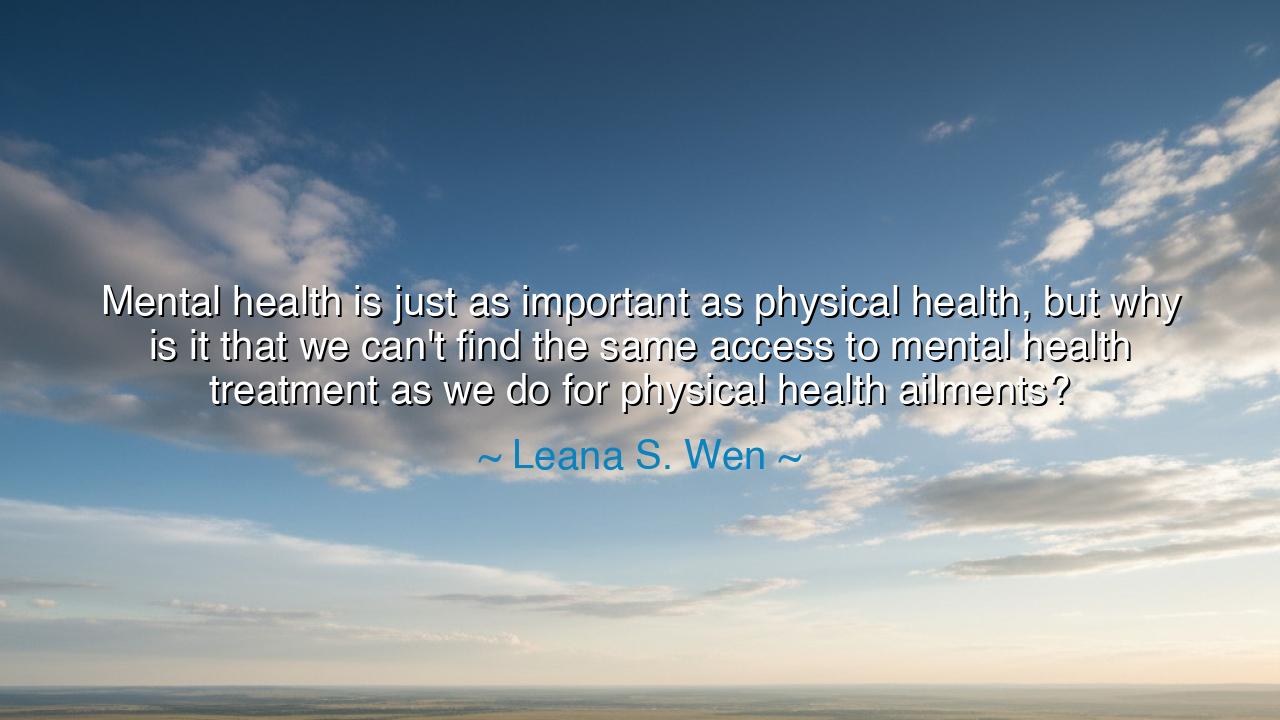
Mental health is just as important as physical health, but why is
Mental health is just as important as physical health, but why is it that we can't find the same access to mental health treatment as we do for physical health ailments?






In an age where the body is examined, measured, and mended by the tools of science, Leana S. Wen, physician and public servant, raised her voice in lament and in wisdom: “Mental health is just as important as physical health, but why is it that we can't find the same access to mental health treatment as we do for physical health ailments?” Her words, though spoken in our time, echo through the corridors of human history — a call to awaken the conscience of society, to see what it has long ignored. For though humanity has cured the body of many diseases, it has yet to learn to tend the wounds of the spirit with equal care and compassion.
From the beginning of civilization, men and women have sought to heal one another. The body’s pain was visible: the fever could be felt, the wound could be seen, the cough could be heard. And so healers arose, armed with herbs and instruments, to bind the broken flesh. Yet the mind, that hidden temple within, was often left to suffer in silence. Those who faltered under sorrow or despair were called weak, those who struggled with anxiety or madness were cast aside, as if their pain were a moral failing rather than an affliction. Thus has the world worshipped physical health as a visible god, while neglecting the unseen sanctum of the soul’s health — though one cannot live fully without the other.
Dr. Wen, through her practice and her advocacy, has seen the cost of this blindness. She has walked the halls of hospitals where the injured are treated swiftly, while those in mental anguish wait in endless queues or face locked doors. She has seen how insurance pays for surgery but not for therapy, how compassion is offered to the heart that falters, but judgment to the mind that breaks. Her question is both scientific and sacred: why do we separate what nature has joined? For the mind and the body are not two kingdoms but one — each breathing life into the other. To neglect one is to doom the other to suffering.
There is an ancient lesson that mirrors her wisdom: the story of King Saul, who, though crowned and mighty, was tormented by a spirit of darkness. His healers could not help him, for they saw only his power and not his pain. But a young shepherd named David played music for him, and in that melody, the king found momentary peace. The story endures as a parable of understanding — that the greatest wounds are often invisible, and that true healing begins not with medicine alone, but with empathy, attention, and human presence. Saul’s illness was of the mind, yet it shaped the fate of a nation. So too today, the unhealed mind ripples through families, communities, and generations.
Dr. Wen’s words remind us that the imbalance between mental and physical care is not only a failure of systems, but a failure of values. We have built vast institutions to heal the body, but few sanctuaries for the troubled spirit. We spend fortunes on the tools of surgery, yet withhold the simple grace of listening. The body can be cured with skill; the mind requires understanding. It is not enough to mend bones if we leave hearts in despair. For when a person’s mental health is neglected, even the healthiest body becomes a cage.
The modern world prides itself on progress, yet in this matter, it lags behind the wisdom of the ancients. The philosophers of Greece, the healers of India, the mystics of China — all understood that the mind and body are mirrors, reflecting one another’s harmony or disarray. In the East, physicians once diagnosed not only the pulse of the wrist but the pulse of the spirit. In the West, thinkers like Hippocrates spoke of balance among the humors — of how melancholy or passion could shape disease. But as science grew, so too did the divide. The body became an object of study; the mind, an afterthought. Now, in our technological age, we must restore what was lost: the unity of healing.
So, O listener of these words, take heed of Dr. Wen’s question — for it is not addressed only to governments or institutions, but to every soul that walks this earth. Ask yourself: do I tend to my mental well-being as I do to my body? Do I nourish my thoughts, rest my heart, and seek help when my spirit falters? Let no shame accompany this care, for to heal the mind is an act of courage, not weakness. Just as we eat to strengthen our flesh, so must we reflect, connect, and seek solace to sustain our inner world.
The lesson, then, is this: the health of the body and the health of the mind are two sides of the same flame. When one flickers, the other dims. To honor both is to live fully, wisely, and well. Let us, as individuals and as nations, tear down the walls that divide mental health from physical health, and build in their place a single sanctuary of care — where the doctor heals not only the wound that bleeds, but the heart that suffers unseen. For the wisdom of Leana S. Wen is eternal: that true health is wholeness, and wholeness is born when the body and the soul are tended with equal love.






AAdministratorAdministrator
Welcome, honored guests. Please leave a comment, we will respond soon